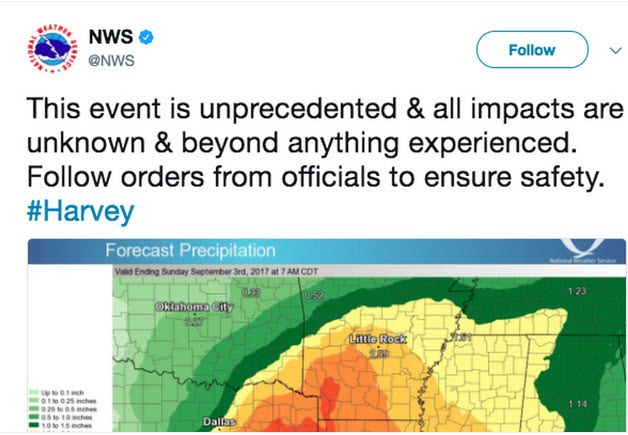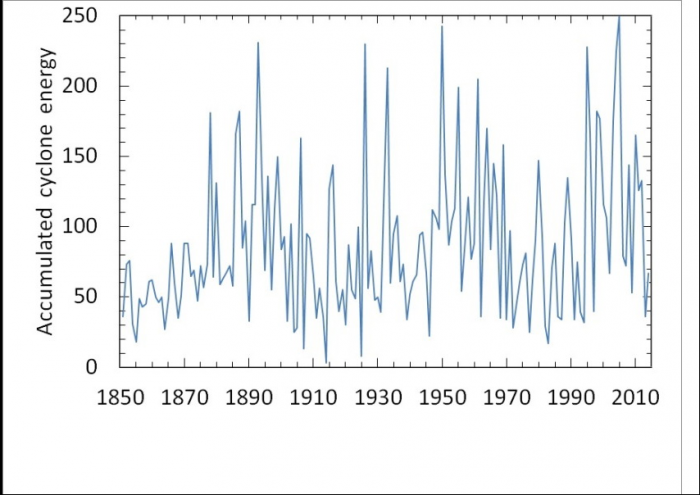Hurricane Harvey - wettest ever. Irma - strongest ever (maybe). And now Grayson. Is this global warming in action?
drummerboy said:
But to deny the possibility that a single event was caused/exacerbated by global warming, at this late date in the game, is a bit naive, I think.
What John Schwartz wrote:
And while the science of attributing weather events to climate change is advancing, “studies of individual events will typically contain caveats,” the report stated.
What the OP linked to:
This raises a few important points. First, finding that climate change contributed to an event is not the same as saying it caused that event. Attribution is about working out if the chance of a particular event happening now is different from what it would be in a world that wasn’t warming.
A useful analogy – as explained in the first BAMS report in 2012 – is of a baseball player who starts taking steroids. If the player begins hitting 20% more home runs than before, you can’t know for sure whether a particular home run is because of the steroids or the player’s spontaneous skill. But you can say how the steroids have altered the likelihood that the player hits a home run, by comparing their current and historical performances.
...
Finally, there is usually a level of confidence attached to attribution results. So, while two studies might both find a role for human influence in a given weather event, the signal may be stronger for one than the other. For the purposes of this analysis, we have not distinguished between high- and low-confidence results, but you can click through to the study for more details.
drummerboy said:
No - we are past trends vs. incidents. Please read my links.
max_weisenfeld said:
Trends vs incidents. While it is not supportable statistically (and therefore scientifically) to attribute this storm's specific charateristics to climate change, it is becoming very clear that a pattern of severe storms, of which this is one, can be attributed to climate change. It's the point tom was making above.
I read the article. I do not agree with the specificity of the conclusion you are drawing from it.
And you, in your posts, are sayibg it is a simple relationship, that is what I was responding to.
drummerboy said:
a 12 foot storm surge with 36 inches of rain is not exactly the same ol' same ol'.
tomcat said:
Hurricanes are nothing new.
That is a specific claim about a specific storm.
However, when you say:
drummerboy said:
this is no longer the consensus. The latest governmental climate change report states that we're now at the point where we can ascribe a probability to extreme weather events as to what effect global warming had on it.
We've reached the tipping point.
ml1 said:
this kind of speculation is just as bad as Jim Inhofe holding up a snowball in the Senate and saying it proves global warming isn't happening.
There's weather, and there's climate. A hurricane is weather.
I agree.
But "ascribing a probability" is not the same as asserting causality.
No, it's not the same, and I didn't intend to imply certain causality. But my point is that we are much further along the path to ascribing global warming effects to individual events than most people think. Much further.
Given the complexity of weather, it's unlikely you can ever ascribe certain causality. No one is making that claim.
Many of the posts here take the position that attempts to ascribe any causality is being hyperbolic and intellectually akin to what the denialists say.
But that is not the case. We're at the point where we can knowledgeably talk about whether a specific event was exacerbated by global warming. That's quite important and I think that's quite a turning point in the climate change conversation, and points to the very strong climate change effects that we are subject to.
here's another link:
https://www.scientificamerican.com/article/yes-some-extreme-weather-can-be-blamed-on-climate-change/
max_weisenfeld said:
...
But "ascribing a probability" is not the same as asserting causality.
did you actually run thousands of computer simulations, or did you just see a weather prediction and come to the conclusion that global warming caused it?
If it's the latter, it's evidence -free
I don't think I ever said Harvey was caused by global warming - did I? Is that the claim you think I'm trying to make? I'm trying to start a discussion based on the latest findings in the science saying that attribution is now a real possibility, and not hysterics, as you claim it is. (I admit I should have expressed that more clearly in the OP - which I have corrected, if you haven't re-read it.)
Anyway, as I said - "evidence free" is an improper way to look at it. The evidence hasn't been collected on it yet, as it's not over yet.
This is the second time I've made this point. Will you disregard it a again?
ml1 said:
did you actually run thousands of computer simulations, or did you just see a weather prediction and come to the conclusion that global warming caused it?
If it's the latter, it's evidence -free
Actually what you originally wrote was worse than what I gave you credit for. You didn't blame global warming for this storm, you blamed Republicans and deniers. If you wanted to start a discussion about what the scientific consensus would say about a storm like Harvey, that's a terrible way to do it. A science minded person would couch questions in ranges and probabilities that climate change is a cause of any one event's severity.
I'm on your side, so I'd think you'd give some credibility to my response. And yes, I still think the way you started this discussion was akin to Inhofe waving a snowball around. Admittedly his stunt was 100 times dumber. But it was the same tactic of taking a big weather event and making claims that a scientist wouldn't make.
It would make sense that those Americans who get the connection between greenhouse effect, fossil fuels and climate change have not the luxury, nor the time, to argue with each other. This is the time to form.a united front against the deniers, whoever they may be. Unfortunately, it may be too late and coastal dwellers globally will have to adapt to the lessons of Hurricane Harvey. Denying climate change, or the need to keep coastal regions sustainable, to keep development intelligent, to limit fossil fuel use and work on environmental issues and clear warnings, won't work any more.
sheesh, that's harsh. 
ml1 said:
Actually what you originally wrote was worse than what I gave you credit for. You didn't blame global warming for this storm, you blamed Republicans and deniers. If you wanted to start a discussion about what the scientific consensus would say about a storm like Harvey, that's a terrible way to do it. A science minded person would couch questions in ranges and probabilities that climate change is a cause of any one event's severity.
I'm on your side, so I'd think you'd give some credibility to my response. And yes, I still think the way you started this discussion was akin to Inhofe waving a snowball around. Admittedly his stunt was 100 times dumber. But it was the same tactic of taking a big weather event and making claims that a scientist wouldn't make.
anyway, ml1, you're still not acknowledging the fact that it is now reasonable for climatologists to have discussions about the extent that a particular extreme event can be attributed to climate change. And to say that bringing up another record-breaking storm (I heard the FEMA director say this morning that they had "never seen a storm like this". Think about that for a second.) within the context of global warming causation is no longer unsupported by the science, and is not even close to Inhofe and his damn snowball.
Not even close.
I will readily admit that at this point it's not possible to talk about the details of possible causation of Harvey, because by necessity that can only be done well after the storm has finished.
But it doesn't mean that laypeople can't discuss it responsibly , within the bounds of their limited knowledge.
drummerboy said:
But it doesn't mean that laypeople can't discuss it responsibly , within the bounds of their limited knowledge.
I have never once disputed this. I only disputed the fact that the way you started this discussion wasn't the way to begin a responsible discussion. You seem to have tacitly admitted that, since you've gone back and edited the first post.
oy.
ml1 said:
drummerboy said:
But it doesn't mean that laypeople can't discuss it responsibly , within the bounds of their limited knowledge.
I have never once disputed this. I only disputed the fact that the way you started this discussion wasn't the way to begin a responsible discussion. You seem to have tacitly admitted that, since you've gone back and edited the first post.
p.s. Your comparison of my OP to Jim Inhofe is w-a-a-a-y off base. There is science behind my statement that makes it a possibility. Unlike Inhofe's stunt.
drummerboy said:
Explain.
FilmCarp said:
This thread is why Republicans win.
Simple. Democrats like us get bogged down in irrelevant stupid discussions about the meaning of a sentence in a climate change discussion while Republicans use that to completely ignore the problem. They show unity when they need to, to such a degree that they still support a disgrace like Trump because at some level they are moving their agenda forward. We can't get behind one candidate because we have two good ones. We lose. You two are arguing about these little details so much that everyone else is checking out of the thread.
I don't think it's a little detail. It's a big problem when people make arguments that their opponents can easily scoff at and swat away. Besides, saying "thanks Republicans" isn't much of an argument anyway.
And the argument has gone on because db never gives in on a point like this. It's a pretty consistent issue that the tone of his arguments turns off people like me who are on his freaking side. Imagine how conservatives react to that tone.
FilmCarp said:
drummerboy said:
Explain.
FilmCarp said:
This thread is why Republicans win.
Simple. Democrats like us get bogged down in irrelevant stupid discussions about the meaning of a sentence in a climate change discussion while Republicans use that to completely ignore the problem. They show unity when they need to, to such a degree that they still support a disgrace like Trump because at some level they are moving their agenda forward. We can't get behind one candidate because we have two good ones. We lose. You two are arguing about these little details so much that everyone else is checking out of the thread.
boy.
Tone of what argument? What about your tone? You haven't relented at all even though you're pretty much dead wrong - at least, at lot wronger than I am.
Anyway....
theglobeandmail.com: Why the U.S. wasn't prepared for Hurricane Harvey
"For the sake of efficiency, we can lump together the issues of wetland management, land-use planning and runaway development by looking at trends in Houston in recent years. In that urban centre, the fourth largest in the U.S., wetlands and other green space have been eaten up by rapid development. According to an analysis for the Houston Chronicle, between 1996 and 2010, the 14-county Houston region lost more than 54,000 acres of wetlands. This not only means that water simply has fewer places to go, but that more lives are put at risk and more property is damaged because of it."
Yes, regardless of what climate change has been doing, development of wetlands has vastly increased to impact of flooding that occurs. Wetlands are wetlands because they do flood. Filling in wetlands does not make the water go away. It just takes away a place for it to go.
The impact of Katrina, Sandy and Harvey were all magnified greatly by the disappearance of wetlands in their respective areas.
No. It's not climate change.
And no, I'm not a climate change denier. But there's a lot of misinformation and pointed politics in this thread. The physics do not support this being driven by climate change. And as much as trump wants to, you can't change science.
The date on this ProPublica report is March 10, 2016:
‘We’re Sitting Ducks:” Houston, home to millions of people and one of the largest shipping lanes in the world, is unprepared for the hurricane that could bring ecological and economic disaster.
https://www.propublica.org/article/houston-ship-channel-hurricane-risk-photo-essay
As you scroll down the text on the left-hand side, the map adjusts itself accordingly.
propublica.org: Boom Town, Flood Town
https://projects.propublica.org/houston-cypress/
Interactive with text and maps of the path of Hurricane Ike, 2008, which surmises what might have happened if Ike had not changed its path.
propublica.org: Hell and High Water
Please explain with some detail what you mean by "The physics do not support this being driven by climate change."
WxNut2.0 said:
No. It's not climate change.
And no, I'm not a climate change denier. But there's a lot of misinformation and pointed politics in this thread. The physics do not support this being driven by climate change. And as much as trump wants to, you can't change science.
Well, lets look statistically first. A single event does not define the mean. We have seen a general down turn in extreme tropical cyclones in the Atlantic basin since 2005. This is likely due to inter-decadal large scale teleconnection patterns that govern the jet stream structures around the globe. If you look at a plot of accumulated cyclone energy (ACE; a cumulative measure of total cyclone energy expenditure summed over all cyclones in the basin) for the Atlantic from 1850 to 2010, there is no discernible low-frequency trend consistent with an increase. All of the higher frequency oscillations are due to these same inter-decadal and smaller oscillatory time scales. See below.
Now to delve into the physics: Hurricanes are driven by ambient conditions characterized by, amongst other factors, a) warm sea surface temperatures (SSTs) and b) low vertical shear (the how wind changes speed with height). There is a small increase in SST trend on record. This very well could be a global warming influence. However, that makes no difference if shear is increased, as a tropical cyclone is, simply put, killed by high amounts of vertical wind shear. Vertical wind shear is driven by meridional gradients in the average temperature within the atmospheric column. Numerical studies, as well as simple physics (e.g., the thermal wind relation), have shown that as global warming increases, either anthropogenic or otherwise, so too does the vertical wind shear. This is because the distribution of the warming is non uniform. If all areas of the globe warmed the same, the shear would stay the same. However, the tropics will likely warm more than the poles, which will increase that temperature gradient, thus increasing the shear and lessening the frequency of these cyclones. This is backed up by studies done by the world's foremost expert on tropical cyclone thermodynamics and energetics, Kerry Emanuel, and has been peer reviewed in nature, arguably the most prestigious peer-review journal:
http://www.nature.com/ngeo/journal/v3/n3/full/ngeo779.html?foxtrotcallback=true
That all having been said, it's also important to separate out the true "event" here. Is the intense hurricane the event? Or is the rain the event? In either case, global warming is likely not attributable, and the only way to truly determine that is through a statistically rigorous detection and attribution study. Either way, to immediately attribute, without any thorough examination, any of the phenomena associated with Harvey to climate change is flat out dangerous. The hurricane itself was overdue. The US hadn't had a landfalling storm like that in 12 years. It was only the fourth landfalling cat. 4+ hurricane in the US since 1970. I'd have to go back and check for sure, but Philip Klotzbach, one of the worlds experts on Hurricanes and a professor/researcher at Colorado State puts the odds of a 12 year stretch of no major landfalls around 1 in 5000 years. Second, the rain is not unprecedented. The flooding is. But lets consider for a moment whats really going on here. The hurricane turned tropical storm produced max rain rates of about 2-3 inches per hour. This is not uncommon in systems like this, where persistent onshore flow off of the Gulf of Mexico, one of the warmest bodies of water in the world, allows for high end atmospheric moisture content. What makes this special is the fact that it didn't move. The jet streams that would normally move the system were to the north. This is seasonally consistent. We shouldn't expect there to be a steering jet over the Gulf of Mexico this time of year. This system stayed put and rained a lot. That is why this flooding occurred. Yes, this is a significant event, but it can not be directly attributed to climate change. End of story.
yahooyahoo said:
Please explain with some detail what you mean by "The physics do not support this being driven by climate change."
WxNut2.0 said:
No. It's not climate change.
And no, I'm not a climate change denier. But there's a lot of misinformation and pointed politics in this thread. The physics do not support this being driven by climate change. And as much as trump wants to, you can't change science.
If you want to make the argument that sea level rise will increase the impacts of the flooding, etc., I buy that. But thats a byproduct of the storm. Not the other way around.
This times about one trillion. And I say this as something of an expert on this subject.
ml1 said:
Actually what you originally wrote was worse than what I gave you credit for. You didn't blame global warming for this storm, you blamed Republicans and deniers. If you wanted to start a discussion about what the scientific consensus would say about a storm like Harvey, that's a terrible way to do it. A science minded person would couch questions in ranges and probabilities that climate change is a cause of any one event's severity.
I'm on your side, so I'd think you'd give some credibility to my response. And yes, I still think the way you started this discussion was akin to Inhofe waving a snowball around. Admittedly his stunt was 100 times dumber. But it was the same tactic of taking a big weather event and making claims that a scientist wouldn't make.
so I guess I'm not "dead wrong."

WxNut2.0 said:
This times about one trillion. And I say this as something of an expert on this subject.
ml1 said:
Actually what you originally wrote was worse than what I gave you credit for. You didn't blame global warming for this storm, you blamed Republicans and deniers. If you wanted to start a discussion about what the scientific consensus would say about a storm like Harvey, that's a terrible way to do it. A science minded person would couch questions in ranges and probabilities that climate change is a cause of any one event's severity.
I'm on your side, so I'd think you'd give some credibility to my response. And yes, I still think the way you started this discussion was akin to Inhofe waving a snowball around. Admittedly his stunt was 100 times dumber. But it was the same tactic of taking a big weather event and making claims that a scientist wouldn't make.
Employment Wanted
Latest Jobs
Employment Wanted
Help Wanted
-
May 3, 2024 at 2:32pm
-
Cat Lovers - become part of our lovely Silver Hound Cat Sitter team
May 3, 2024 at 2:12pm
-
PT Driving mother’s Helper needed
May 1, 2024 at 10:31am
-
May 1, 2024 at 9:10am
-
May 1, 2024 at 9:10am
-
Part-time Nanny in Scotch Plains
May 1, 2024 at 9:10am
-
May 1, 2024 at 9:10am
-
May 1, 2024 at 9:10am
-
Full-time Nanny in Scotch Plains
May 1, 2024 at 9:10am
-
Nanny Wanted Live in or Live out $1400-$1600
May 1, 2024 at 4:49am























Harvey is the first major hurricane to hit the US since 2005. There is a bit of a technically because Sandy was not a hurricane when it hit but rather had merged with another system and was a "superstorm". Now that gap means nothing except climate change deniers point to it the same way DB points to Harvey. But neither can be used to prove anything.